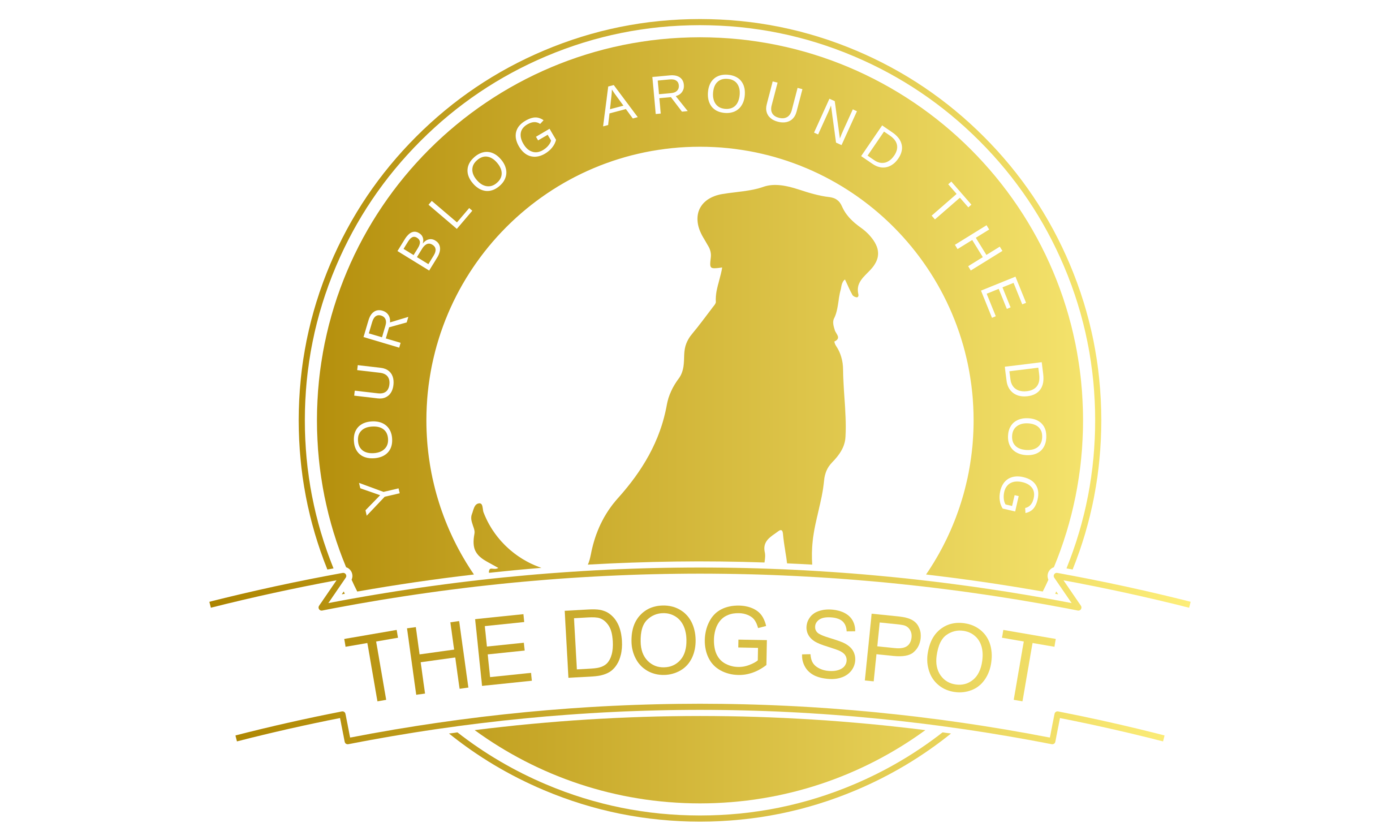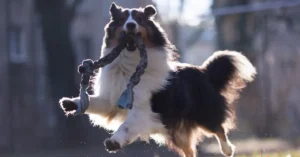Who doesn’t know it, the dog sitting beguilingly at the table, with those big, hopeful eyes that almost make us share our food? But why do dogs beg for food? It’s not just an endearing expression of desire—there’s more to it.
Dogs beg for food because it’s a successful form of communication for them, often learned through positive reinforcement. It’s a behavior reinforced when they get food after begging, leading them to repeat it in hopes of a reward. Additionally, begging is often a social interaction for dogs, an attempt to participate in human activities.
Moreover, dogs are naturally opportunistic eaters. If they see a chance to get tasty human food – which undoubtedly smells and looks more appealing than their own – they’ll seize it. By understanding that this behavior is normal and influenced by our reactions, we can learn to manage it appropriately and help our dogs develop healthy eating habits.
Why Do Dogs Beg For Food: Origin of Begging Behavior
Our loyal companions often ask for food, but have we ever wondered why do dogs beg for food? It’s more than just a craving for a treat; it’s a deeply rooted behavior.
Evolutionary Biology and Domestication
Our beloved dogs are descendants of wolves, where begging was partly crucial for survival. In a wolf pack, members secure their share of the prey by begging, especially if they aren’t the leaders. Despite thousands of years of domestication, dogs have retained this instinctive begging behavior.

Reinforcement by Humans
When we respond to our dog’s begging with food rewards, we reinforce this behavior through positive reinforcement. Dogs quickly learn that begging is a successful strategy to get what they want and continue the behavior to receive more rewards.
Begging in dogs has its reasons rooted in both evolutionary history and interactions with humans. By understanding this behavior, we can help our four-legged friends develop healthier habits.
Why Do Dogs Beg For Food: Behavior Training Against Begging
Now that we know why dogs beg for food, if we want to work on this behavior with our furry friends, effective behavior training can counteract this desire.
Training Basics
Training relies on patience and sustainability. It’s essential to first solidify basic commands like sit and stay before addressing specific behavioral issues like begging. The key elements of training include:
- Clearly defined rules: Set clear boundaries from the start.
- Rewarding good behavior: Reinforce behaviors you want to see.
- Consistency: Stay consistent in enforcing your rules.
Strategies to Reduce Begging Behavior
To curb begging, targeted strategies should be applied:
- Ignore begging behavior: No attention or food when the dog begs.
- Separate meal times: Feed your dog at times different from your mealtime.
- Use commands: Redirect the dog’s behavior with commands.

By employing these techniques, you effectively work with your furry friend on the issue of why dogs beg for food.
Importance of Consistency
Without consequences, no effective training can take place. We must remain sustainable and consistent to correct undesirable behavior like begging. This requires:
- Willpower: Resist giving in, even when it’s challenging.
- Regularity in training: Daily practice sessions increase success chances.
- Clear rules: Consistently demand the same behavior from all family members.
Adhering to these principles is crucial for the success of your training.
Nutrition and Health
We know that begging in dogs is often influenced by their feeding habits. But how does this affect their behavior, and what role does the vet play? Let’s take a closer look.

Effects of Feeding Habits on Begging
Begging in dogs is a learned behavior reinforced by owners’ reactions to begging. When dogs realize that they can get treats or extra food by begging, they repeat this behavior. To prevent this, it’s crucial to be consistent and not give in to every request. Your dog’s body weight can also be a crucial factor – overweight dogs might beg more due to an unbalanced diet compared to dogs with a normal weight and physique.
Role of the Veterinarian
In assessing your dog’s nutritional status, the veterinarian plays a crucial role. Your vet can provide recommendations on the amount and type of food and help create a feeding plan that reduces begging. This ensures that your dog is adequately satisfied with their regular food. Furthermore, your vet can offer useful tips on when and how often treats are appropriate as rewards.

Other Factors
So, we should be aware that not only hunger is the cause of why dogs beg for food. There are other influences, such as toys and activity, as well as emotional aspects that can affect this behavior.
Role of Toys and Activity
Toys and physical activities significantly contribute to satisfying your dog’s need for movement and mental stimulation. A high activity level and sufficient mental stimulation can lead to less begging, as the dog is tired out by play and exercise. However, if there’s a lack of engagement, begging might be a way to gain attention and combat boredom.
Emotional Components of Begging
In the topic of why dogs beg for food, emotional factors also play a crucial role. Dogs are patient observers and often know how to manipulate us with their “Puppy Dog Eyes.” This strategic use of gaze and whining can be a form of emotional connection or a learned behavior to gain attention and treats.

Our Summary
The reasons why do dogs beg for food are very diverse – partly an evolutionarily conditioned ability that our furry friends owe to their ancestors, the wolves.
By shaping our behavior in response to this instinct, we influence our dogs and teach them that begging brings rewards in the form of food. Additionally, our four-legged companions use begging as a means of communication with us, knowing precisely how to get a treat with their behavior.
If you want to curb this behavior, it’s essential to conduct training with patience and consult your vet beforehand about appropriate nutrition and the amount of treats suitable for your dog.
Also, check whether your dog has a good feeding routine and is adequately engaged through movement and play during the day.
For successful training on why do dogs beg for food, it’s crucial to reward positive behavior consistently and stay consistent in training new routines.
The basis for successful training is time, patience, and sustainability – practice regularly with your furry friend and keep the training sessions a bit shorter.
The rest of the family members should also be involved in the training and work with your dog on this issue; otherwise, you won’t achieve any success.
If you follow our tips and give yourself and your furry friend some time to learn this new behavior, you will soon be able to put a checkmark behind the problem of why do dogs beg for food.
We wish you a lot of fun and success in training!

Are you interested in more information on the topic of dog food? Then we recommend our articles on this subject. You can find them here.
Are dogs actually hungry when they beg for food?
Dogs beg for food for reasons beyond just feeling hungry, according to sources discussing “why do dogs beg for food.” Begging can be a learned behavior to get rewards or attention. However, it can also signal underlying medical issues. So while not always a sign of hunger, begging warrants attention to determine the cause
Is it instinct for a dog to beg for food?
Yes, begging for food is an innate instinct in dogs, according to sources discussing “why do dogs beg for food.” As opportunistic scavengers evolutionarily dependent on humans for food, dogs are wired to seek out scraps. However, reinforcement can strengthen this behavior, so it’s ideal to avoid rewarding begging to prevent it from becoming an undesirable
Do dogs ever feel full?
No, dogs don’t have the same internal cues to signal fullness that people do, according to sources discussing “why do dogs beg for food.” While they may stop eating when satiated in the moment, their appetite will return quickly. Dogs are opportunistic eaters and rarely feel too full to accept more food, which contributes to begging behaviors.
Is it rude for a dog to beg?
No, begging for food is not an inherently rude behavior in dogs according to sources discussing “why do dogs beg for food.” Begging is simply an instinctual scavenging behavior wired into dogs over generations. However, reinforcement of begging through rewards can lead to pushy, undesirable behavior at mealtimes. Setting boundaries and ignoring begging is key to discourage rudeness.
Did you find our article on ‘Why do dogs beg for food?’ helpful, or do you have any further questions? Let us know in the comments. If you have additional tips or ideas, we’d love to hear them.








